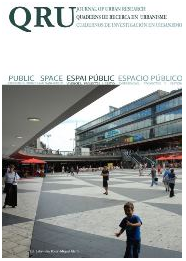Sobre espacio público y su proyecto urbano
DOI:
https://doi.org/10.5821/qru.9539Abstract
Barcelona has been since the beginning of the eighties an exceptional laboratory in order to study the public space renewal, through both redesign processes and strategic urban projects. Meanwhile, the Architectural School of Barcelona has tied its teaching and research to the urban transformation of the city, which has produced a rich reflection on urban projects, through courses and publications. A result of this theoretical framework were some PhD dealing with public space, some of them concerning the recovering of more traditional public space in the compact city, some others studying new forms of open space in the metropolitan context. Following these first doctoral researches, a specific line on public space research was created. A comparative study on public space policies in European cities has been carried on and several PhD on current issues about public space have been started. Some of the studied subjects are: collective spaces in leisure artefacts, infrastructural nodes in metropolitan networks, large open spaces in river valleys, hybrid spaces in Asian cities, civic meaning of contemporary social spaces…Downloads
Issue
Section
License
Those authors who have publications with this journal, accept the following terms:
a. Authors will retain their copyright and guarantee the journal the right of first publication of their work, which will be simultaneously subject to the Creative Commons CC BY-NC-ND-4.0 recognition license that allows third parties to share the work provided that its author and its first publication are indicated in this journal, but they cannot be changed or used commercially.
b. Authors may adopt other non-exclusive license agreements for the distribution of the version of the published work (eg: deposit it in an institutional telematic archive or publish it in a monographic volume) provided that the initial publication in this journal is indicated.
c. Authors are allowed and recommended to disseminate their work through the Internet (e.g. in institutional telematic files or on their website) before and during the submission process, which can lead to interesting exchanges and increase citations. of the published work. (See The effect of open access).













